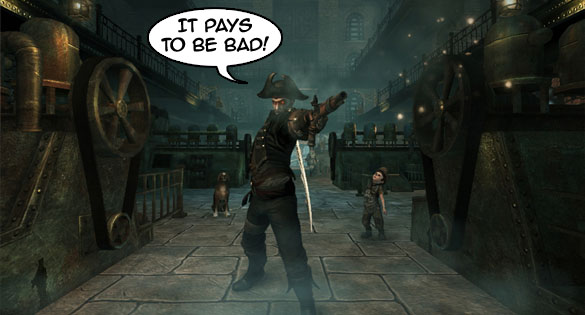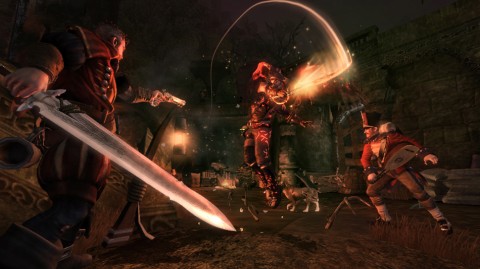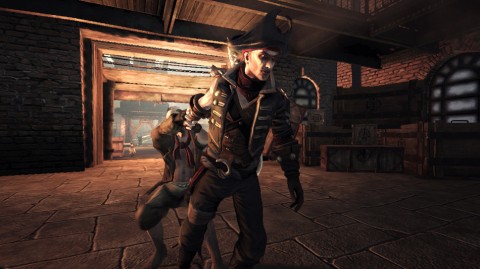Fable III review AKA grinding for the greater good
I enjoyed the first two installments of Fable. Though never the most challenging gameplay Peter Molyneux and company managed to draw me into the world of Albion with their unique take on fantasy style role playing and a quirky sense of humour. Fable III is no different, and in many ways an improvement. I think there’s a fundamental flaw with the second half of the game, which can’t be talked about with spoilers, but don’t worry, you’ll be warned.
Fable III starts off 50 years after the events of the last installment, as you play the younger child of the Hero from the last game. There’s a moderately Victorian era vibe to the world now, particularly the city of Bowerstone, which is in the midst of it’s own Industrial Revolution. The land is currently ruled by your older brother Logan, who started out well enough, but over the past few years has turned into a tyrannical prat. When his tyranny turns personal against you, you decide to start a revolution to oust him. Going it alone isn’t going to cut it, so you trek out into the world, seeking support from Albion’s various regions. Many of these places have felt first hand the iron fist of your brother’s rule, so besides completing quests for the regions, you also have to make promises to make things better when you take over. You know, little things like ending child labour and the such. It’s a solid story, and the various quests large and small are all fun to play through. Though rarely presenting a seasoned player with a real challenge, the story is never dull. The writing is solid, laced with a good sense of humour and there’s rarely a dull moment. It also helps that there’s some great voice talent at work in Fable III. The various side quests all exhibit the same quality. One such quest, which involves you being shrunk down to play in a real life Dungeons and Dragons type RPG was particularly amusing.
The once horrible mapping system is replaced with an easy to use, informative 3D map room, which allows you to drill down into particular locations, enabling you to manage properties you own, and quickly traverse the world. This is part of a larger Sanctuary which you can hop into at any time to view the map, change weapons and magic load outs, look in your treasure room or access the multiplayer aspects of the game. Due to the excellent map system, buying property in Fable has never been easier. Just navigate to any region you’ve unlocked, and zoom into shops and homes to purchase. When you own a shop or home, you can raise lower prices/rent, which has an impact on your standing, and will generate a steady stream of revenue, which you can check out in the aforementioned treasure room.
Even leveling up is done via a new “Road To Rule” interface. By playing the game, you’ll earn Guild Seals, which stand in for experience points, and as you travel the “Road To Rule”, you’re presented with chests to open that will increase your abilities. Each chest has a Guild Seal cost, and makes for a fun and intuitive interface for powering up your character.
From a gameplay perspective, all is not well in Albion. Stripping away superfluous numeric equations from an RPG is a great idea, and maybe the Fallout franchise could learn a lesson or two here. Everything becomes much more organic and the tale becomes much more engaging. At the same time, the combat mechanics, like the earlier installments, is still too watered down. Lionhead has distilled combat into 3 buttons, one each for melee, ranged and magic attacks. The penalty for failing is almost non-existent. Instead of dying, you’re knocked out, which carries only a minor Guild Seal penalty of erasing your progress for the current Seal. In playing through, I realized that if I did hit some tough foes, by making sure I get that one last kill, being knocked out was hardly a penalty at all. This isn’t a major flaw though, as the limited consequences are made up for by keeping the story flowing.
It’s when you do become king (or queen) of Albion when things take a turn for the worse. Now this is going to contain spoilers, so you’ve been forewarned, so there’s an obligatory line break here…
After assuming the throne, your jerk of a brother explains that the reason for his tyrannical run is that a great external threat is looming over the kingdom, and will attack in one year’s time. It’s already destroyed the land of Aurora, and Albion is next. His iron fist was all in the name of the greater good, as the kingdom has to raise 6.5 million gold by that time to have a strong standing army to save the population. If the kingdom has zero gold, the citizens will all die. That’s why Logan made the tough calls. Now that the weight is on your shoulders, you’re going to have to keep that in mind and maybe make some tough decisions too, right?
Maybe.
Remember those promises? It’s here where you get to keep them or break them. Keeping them means more money drained from the coffers (and it’s possible to go into the red, like I did) and the love of the people. Break them, and you’re a tyrant too, but you’re going to save more people. You need 6.5 million gold to save 6.5 million people, so the math’s not hard. You still have a year to build up the treasury, but there’s a couple of fundamental design problems. The treasury itself is separate from you personal treasure, but you can move gold between the two at any time.
First, there’s no real logic in a king going out on adventures through the land, whether it’s patching up relationships or playing Lute Hero for some spare change. With 365 days until the darkness comes, it’s also frustrating that there’s no real way to gauge the passage of time. When I completed certain story based quests, I was informed that an arbitrary number of days has passed, putting more pressure on me to get earning. Sure, time passed in the game before, but now it’s something that I need to have a real handle on. Without being told that even approximately X number of days will pass if I go on a quest, it’s impossible to manage. It would have been nice if I were given a Royal Timepiece and some warning when I select a quest.
Second, whether this is was the intention of the designers or not, the net effect of making this black and white mathematical formula for saving the people turns Fable III into a spreadsheet game. The love and support from the people doesn’t amount to a hill of beans, because you’re never given chance to tell them to buck up because there’s a darkness coming. For a game that spends so much of it’s energies creating emotional engagement between the player and the inhabitants of the world, I couldn’t help feel there was an underlying cynicism about people in a time of crisis. What happened to that ‘power to the people’ vibe that the first half was all about? I felt that the designers tossed all that aside once I donned the crown. If I made positive decisions affecting their daily lives, and made them aware of the threat, would they not rally around their new leader? Everything in Fable has had a natural granularity when it came to interpersonal relationships, but on the larger scale it just faded to the background.
How to be a good guy and save everybody in Fable III – time does not equal money.
If you want to keep your promises and save the world, simply stop doing quests. Seriously. After being disappointed with the new money=survival mechanic, and getting punished for not breaking promises, it quickly became clear how to get around the major deficit in the kingdom’s treasury. It becomes a grinding game. Most properties will earn you your investment back in about thirty 5-minute pay cycles. This is just over 2 hours of gameplay. If you started buying shops early in the game, and continued doing so, you’ve probably already got a healthy income. Just continue to invest and watch your coffers grow. In the meantime, you can still spend a lot of time hunting down the Garden Gnomes, visiting the Demon Doors and plenty more. While tooling around the world without embarking on the major quests, time is at a standstill, so a busy landlord can easily get to the point where they raise enough gold to defeat the darkness and throw an awesome party afterward.
This is the end of the spoiler.
Like most people, when I play these types of games, I want to be the Hero. Given the above gameplay scenario, it’s just way easier for an evil character who doesn’t care about the population at large to finish the game and have fun doing it. The last half of Fable III essentially turns into Farmville writ large for do-gooders like me. That’s not what I signed up for.
That doesn’t mean there isn’t a lot to enjoy in the game, and I played it a fair bit. I haven’t finished it though. Unfortunately, after a few hours of playing as king, I just lost interest when it turned into a numbers game, and have shelved it for a rainy afternoon. Lionhead has to be commended for adding something new to the Fable series, but concept and execution are two different things. Sure I understand the kind of decision making that Lionhead was shooting for, but in a game that previously had nuance of behaviour as a strong point, it just didn’t work once I became the head cheese.








[…] This post was mentioned on Twitter by Doug Groves, rgbFilter. rgbFilter said: Fable III review AKA grinding for the greater good: I enjoyed the first two installments of Fable. Though never… http://bit.ly/eujIUi […]
[…] Just in time for the holidays, we’re announcing the first of a few giveways we have coming up. This time around, it’s a copy of Fable II for the Xbox 360. You can check out our review here. […]
893265 583757Outstanding weblog here! Also your internet site loads up quickly! What host are you utilizing? Can I get your affiliate link to your host? I wish my site loaded up as speedily as yours lol 937176
765514 91453As soon as I discovered this site I went on reddit to share some of the enjoy with them. 750702